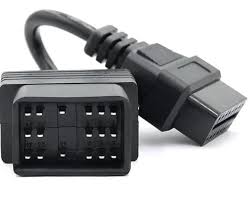Jumpering the OBD2 port on a Toyota vehicle involves connecting specific pins on the OBD2 connecter to access and retrieve diagnostic trouble codes (DTCs) without needing a scan tool. This method is often used by professional mechanics or enthusiasts who want to troubleshoot their vehicles quickly.
In this article, I will share with you how to jumper the OBD2 port on a Toyota vehicle.
Locate the OBD2 port
The OBD2 port is usually located under the dashboard on the car’s driver’s side. It looks like a ladder with many needles inside.
Prepare the jumper wire
You will need a jumper with two alligator clips at each end. Ensure the cable is long enough to extend from the OBD2 connector to a suitable ground in the engine compartment.
Identify the specific pins to the jumper
The pins that need to be jumpered to the Toyota OBD2 port are pin 4 (Chassis Ground) and pin 13 (Diagnostic Terminal).
Connect the jumper wire
With the vehicle turned off, connect one end of the jumper to pin 4 (Chassis ground) of the OBD2 port. You can use a multimeter to check the ground point. Then connect the other end of the jumper cable to the appropriate ground on the chassis or engine.
Turn the ignition key to the ‘’ON’’ position
Turn the key to the ‘’ON’’ position without starting the engine. This will activate the vehicle’s onboard computer and start diagnostic mode.
Count the number of blinks
Once the ignition is on, the Check Engine Light (CEL) will start blinking in a specific pattern. Each blink represents a digit in the trouble code sequence. For example, two blinks followed by a pause, then two more blinks indicate the trouble code ‘’22’’.
Related Post>>>How To Turn On RCD Toyota Camry 2018
Decode the DTCs
Note the number of flashes in the correct order and refer to the Toyota OBD2 code chart to determine the diagnostic problem. This will help you identify the specific problem with your vehicle.
Clear the codes (optional)
After clearing the fault codes, they can be cleared by cutting the jumper and turning off the ignition for a few seconds.
However, it is recommended to resolve the underlying issue before removing the code.
Conclusion
Jumpering the OBD2 port on your Toyota vehicle is a handy technique for accessing diagnostic trouble codes without the need for a scan tool. By locating the correct pins on the OBD2 connector, you can quickly retrieve important information about your vehicle’s health and performance.
This method can help you troubleshoot issues and make necessary repairs more efficiently. Just remember to use caution and follow the correct steps to ensure the safety and effectiveness of the jumpering process.


